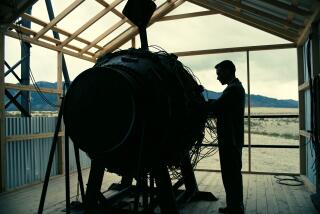Japanese TV Views Americans’ Antics : Culture: In Tokyo, ‘Daybreak’ accents the offbeat in presenting the ways we amuse ourselves. The show might be called ‘Stupid American Tricks.’
- Share via
TOKYO — It’s breakfast time on a muggy summer morning, and all over Japan people are looking up from their rice and soup to watch a morning news show that might be called “Stupid American Tricks.”
The actual name of the increasingly popular program on the national Asahi TV network is “Daybreak.” But in tone and substance, it frequently resembles David Letterman’s “Stupid Pet Tricks”--with Americans providing the amusement.
The hourlong show features news clips, mainly provided by Cable News Network, about current doings in the United States. Among the stories shown in recent weeks have been these slices of American life: A man in Louisiana who turned a room of his house into a shrine honoring a roll of toilet paper he stole from Graceland, the Elvis Presley museum in Memphis. A contest in Texas where men reach into a basket full of rattlesnakes to see who can pick up the most without being bitten. Women in Florida arguing passionately for their constitutional right to reveal bare buttocks on the beach. A “pierce boom” in California, where some teen-agers have pierced not only ears but also noses, navels, nipples, chins and fingers to wear jewelry.
After each news clip, the show’s two anchors, Katsuya Konishi and Mayumi Kawase, offer explanatory comments. Following a report on U.S. women suffering permanent bone injuries because of overexercise, Kawase told the audience that Americans “have a need to be perfect.”
After a recent story on some people in Oregon who decided to make the world’s largest world map, Konishi raised an eyebrow. “Americans drawing a map,” he said dryly. “I wonder if they know where Japan is.”
The often scathing view of America presented to Japanese viewers on this and many other TV shows both stems from and feeds a sharp change in traditional Japanese attitudes toward the United States.
“There is a very clear sense here,” said political scientist Seizaburo Sato of the University of Tokyo, “that America is a country in trouble. This image is everywhere in our media.”
“There has been an obvious shift between generations,” said Konishi, the 36-year-old kyastah --the Japanese version of “newscaster”--on “Daybreak.”
“Our generation, people who don’t remember the war and the occupation . . . would think there is not much we can learn from America,” Konishi said in an interview. “This is the epicenter of rising Japanese nationalism. I want to present the U.S. as a contemporary of ours, but there is a view of . . . America as a country with less culture, less civilization.”
Modern Japanese life, of course, is suffused with American culture. McDonald’s, Mr. Donut, and 7-Eleven stores are everywhere. American slang pops up in every sentence.
TV and print media are jammed with American pop icons ranging from Pete Rose to Prince to Miss Piggy. Bookstores carry American nonfiction and novels by the hundreds, both in English and in Japanese translation.
But all that has become such a standard part of Japanese life, Konishi noted, that people don’t think of it as American anymore. “They take what happens in New York or Hollywood as part of their own culture,” he said.
Instead, the Japanese draw their current image of the United States largely from television. And the picture of America portrayed on Japanese TV, by and large, is of a country mired in crime, drugs, corruption and greed.
One day last week on “Daybreak,” for example, Konishi asked a TV Asahi New York correspondent, Aiko Yabuki, for the latest news from the Big Apple. Yabuki replied with stories about several recent shootings of toddlers, plus a string of 22 murders of cab drivers.
The mere fact that a major national network would design an hourlong show devoted almost totally to information about the United States and broadcast it during morning prime time evidences Japan’s continuing fascination with America and Americans.
The show is seen in the Tokyo area from 6 to 7 a.m., when people are getting ready for the long commute to work.
Konishi is well-versed in American lore. He spent a year in high school as an exchange student in Chicago, speaks an easy, idiomatic English and wrote a master’s thesis in American studies. Kawase, 27, his female counterpart, speaks almost no English and said she has no firsthand knowledge of America other than a vacation in Hawaii.
The two commentators work from a studio set similar to that on U.S. evening news shows. Like other kyastahs here, they sit up in their chairs and bow deeply to the audience before commercials.
Some of the stories on “Daybreak” are laudatory. The program has reported on clever ideas that came out at an American inventors’ convention. A Japanese sports writer who visited the show after touring America was clearly impressed with the racial harmony he observed in big-league athletics.
Mainly, though, “Daybreak” is about strange American happenings, such as Roseanne Barr croaking the national anthem and a contest where people competed to iron the most clothes.
“America is so interesting,” Konishi said. “I think we have to admit that in our editing process, we might pick stories that are unusual, just because that’s what interests us Japanese.”
More to Read
The complete guide to home viewing
Get Screen Gab for everything about the TV shows and streaming movies everyone’s talking about.
You may occasionally receive promotional content from the Los Angeles Times.






